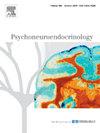不同记忆阶段,皮质醇对项目记忆和联想记忆的影响不同
IF 3.4
2区 医学
Q2 ENDOCRINOLOGY & METABOLISM
引用次数: 0
摘要
我们的日常生活充满了压力,这有力地塑造了我们形成、巩固和检索情景记忆的方式。因此,应激激素会影响个体事物及其关联的不同记忆阶段,无论它们是中性的还是情绪化的。然而,我们对压力事件记忆中所有这些因素之间的相互作用仍然知之甚少。为了解决这个难题,我们采用了受试者内双盲安慰剂对照设计,外源性皮质醇(10 mg氢化可的松)影响不同的记忆阶段(编码前、编码后、检索前)。我们的参与者编码中性的和情绪化的名词-图像对。在24 小时的延迟之后,我们测试了他们对单个项目(名词)和它们的关联(名词-物体)的记忆。在考虑基线(无压力)记忆表现时,我们发现皮质醇对项目和联想记忆的影响是不同的,这取决于受影响的记忆阶段和记忆的情绪。编码后皮质醇处理增强了项目记忆,编码前和检索前皮质醇处理削弱了项目记忆。同样,预编码皮质醇管理也会损害联想记忆,但仅限于中性刺激。此外,我们观察到唾液皮质醇水平和记忆的情绪调节项目和联想记忆的表现。这些发现强调了应激激素皮质醇在所有记忆阶段如何以不同的方式调节中性和情绪事件的项目和联想记忆的复杂相互作用。本文章由计算机程序翻译,如有差异,请以英文原文为准。
Distinct cortisol effects on item and associative memory across memory phases
Our daily lives are filled with stressful situations, which powerfully shape the way we form, consolidate, and retrieve episodic memories. As such, stress hormones affect different memory phases of both individual items and their associations, whether they are neutral or emotional. However, an interplay between all these factors in our memory of stressful events is still poorly understood. To address this conundrum, we employed a within-subject, double-blind, placebo-controlled design with exogenous cortisol administration (10 mg hydrocortisone) to affect different memory phases (pre-encoding, post-encoding, pre-retrieval). Our participants encoded neutral and emotional noun - image pairs. After a 24 h delay, we tested their memory for individual items (nouns) and their associations (nouns - objects). While accounting for baseline (no stress) memory performance, we found divergent cortisol effects on item and associative memory, depending on affected memory phase and on emotionality of memoranda. While post-encoding cortisol administration enhanced item memory, pre-encoding, and pre-retrieval cortisol administration impaired item memory. Similarly, pre-encoding cortisol administration impaired associative memory, but only for neutral stimuli. Moreover, we observed that both salivary cortisol levels and emotionality of memoranda modulated item and associative memory performance. These findings highlight a complex interplay of how stress hormone cortisol, throughout all memory phases, differently modulates item and associative memory of neutral and emotional events.
求助全文
通过发布文献求助,成功后即可免费获取论文全文。
去求助
来源期刊

Psychoneuroendocrinology
医学-精神病学
CiteScore
7.40
自引率
8.10%
发文量
268
审稿时长
66 days
期刊介绍:
Psychoneuroendocrinology publishes papers dealing with the interrelated disciplines of psychology, neurobiology, endocrinology, immunology, neurology, and psychiatry, with an emphasis on multidisciplinary studies aiming at integrating these disciplines in terms of either basic research or clinical implications. One of the main goals is to understand how a variety of psychobiological factors interact in the expression of the stress response as it relates to the development and/or maintenance of neuropsychiatric illnesses.
 求助内容:
求助内容: 应助结果提醒方式:
应助结果提醒方式:


